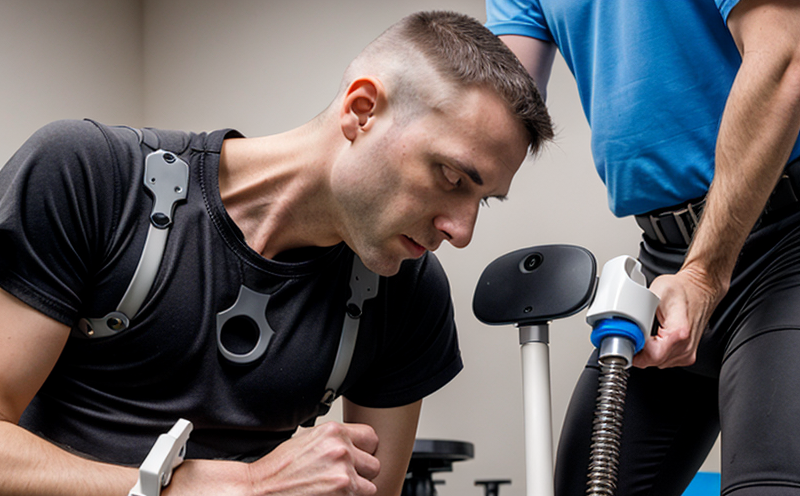ASTM F3306 Fatigue Testing of 3D Printed Prosthetic Implants
The ASTM F3306 standard is designed to evaluate the fatigue strength of three-dimensional (3D) printed orthopedic and prosthetic implants. This testing method is particularly crucial in ensuring that medical devices meet stringent safety standards, especially those fabricated using advanced manufacturing techniques like additive manufacturing.
The process involves subjecting specimens to cyclic loading until failure occurs, allowing for the determination of fatigue life under controlled conditions. This is essential because fatigue strength can vary significantly depending on factors such as material properties, microstructure, and post-processing treatments. For 3D printed prosthetics, these variables are particularly critical given the complexity of their geometry.
The testing protocol specified in ASTM F3306 requires a detailed understanding of both the material composition and the manufacturing process used to produce the implant. Compliance with this standard ensures that the device can withstand the stresses encountered during typical use without compromising patient safety or efficacy.
Specimens for fatigue testing are typically prepared using the same 3D printing parameters as those intended for clinical use, ensuring that the results accurately reflect real-world performance. The cyclic loading is conducted at a specified frequency and load amplitude to simulate the dynamic forces experienced by the implant during activities of daily living or athletic pursuits.
The testing apparatus used in compliance with ASTM F3306 includes specialized fatigue testers capable of applying precise loads over extended periods while monitoring strain and stress levels. These instruments provide real-time data on how each specimen responds under cyclic loading, which is then analyzed to determine the onset of fatigue cracks or overall failure.
The acceptance criteria for passing this test are based on achieving a specified number of cycles without failure or meeting certain strength thresholds after a predetermined period. Compliance with these standards not only ensures regulatory approval but also enhances public confidence in the reliability and longevity of 3D printed prosthetic devices.
Understanding the nuances of ASTM F3306 fatigue testing is vital for quality managers, compliance officers, R&D engineers, and procurement professionals who are involved in developing or sourcing these critical components. By adhering to this standard, manufacturers can produce reliable products that meet global regulatory requirements while maintaining high standards of patient care.
The rigorous nature of ASTM F3306 fatigue testing underscores the importance of precise control over every aspect of the manufacturing process, from material selection and design optimization through to final inspection. This approach ensures that 3D printed prosthetic implants are both safe and effective for their intended applications.
Benefits
- Elevated Patient Safety: Ensures that the implant can withstand long-term use without failure, reducing the risk of complications.
- Regulatory Compliance: Meets international standards, facilitating smoother market entry and regulatory approval processes.
- Enhanced Product Reliability: Provides data on fatigue life, helping manufacturers improve product design and durability.
- Informed Decision-Making: Allows for better-informed decisions regarding material choices and manufacturing processes.
The results from ASTM F3306 fatigue testing offer valuable insights into the mechanical performance of 3D printed prosthetic implants, contributing significantly to their overall quality assurance. This information is instrumental in guiding further improvements and innovations within the field.
Eurolab Advantages
At Eurolab, we pride ourselves on offering comprehensive services that meet the highest standards of accuracy and reliability. Our expertise in ASTM F3306 fatigue testing ensures that every test conducted adheres strictly to the specified protocols outlined by the standard.
- Precision Instruments: Utilizing state-of-the-art fatigue testers capable of delivering precise measurements for accurate results.
- Comprehensive Reporting: Providing detailed reports that include all relevant data points necessary for comprehensive analysis and interpretation.
- Experienced Professionals: Our team consists of highly skilled engineers with extensive experience in medical device testing, ensuring consistent quality across all tests.
- Compliance Expertise: Ensuring full compliance with international standards, including ASTM F3306 and other relevant regulations.
We take pride in our commitment to excellence, delivering results that are not only accurate but also actionable for continuous improvement. Whether you're developing new products or simply need to ensure existing ones meet stringent quality benchmarks, Eurolab is here to support your needs with precision and professionalism.
Why Choose This Test
- Predictive Insights: ASTM F3306 fatigue testing provides valuable predictive insights into the expected lifespan of 3D printed prosthetic implants, enabling manufacturers to make informed decisions about design and manufacturing processes.
- Regulatory Compliance: Ensures that your products meet all necessary regulatory requirements, streamlining the approval process and minimizing potential delays.
- Enhanced Reputation: Demonstrating a commitment to quality through rigorous testing enhances your company’s reputation among clients and partners alike.
- Customer Trust: Providing robust evidence of product reliability fosters trust between you and your customers, which is crucial in the medical device industry.
The ASTM F3306 fatigue test offers more than just compliance with international standards; it provides a robust framework for ensuring that every 3D printed prosthetic implant meets the highest levels of safety and efficacy. By choosing this test, you're investing in your product's future success and patient well-being.





